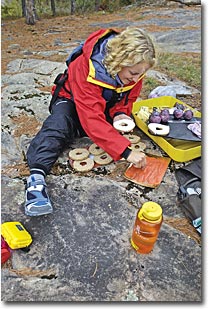How to Boat and Camp with Perishable Foods
By Mark Scriver, Wendy Grater and Joanna Baker
The following is an excerpt from the book Camp Cooking: Eating Well in the Wild
 Fresh meat, fruit, vegetables and bread add variety, texture and taste to your menu but some of these foods will spoil or be crushed easily. There are many factors affecting how long perishable foods will last including how ripe the food is when packed, the temperature during the trip, how the food is packed, contact with moisture or air, and how sensitive the fresh food is to being crushed. Check food that can spoil periodically during the trip so you can use it before it goes bad and to prevent the spoilage from spreading.
Fresh meat, fruit, vegetables and bread add variety, texture and taste to your menu but some of these foods will spoil or be crushed easily. There are many factors affecting how long perishable foods will last including how ripe the food is when packed, the temperature during the trip, how the food is packed, contact with moisture or air, and how sensitive the fresh food is to being crushed. Check food that can spoil periodically during the trip so you can use it before it goes bad and to prevent the spoilage from spreading.
On the subject of durability, try to minimize food that is overly bulky or easily crushed (like nacho chips) or have it early on the trip. With so many variables it is difficult to predict how long perishable food will last but here are some basic guidelines:
Bread and Baked Goods
Light buns and sliced white flour bread should be used in the first few days. Whole wheat un-sliced loaves will last a little longer if they aren’t crushed. Because pita bread is flat and dry, you might expect it to keep well, but it has a lot of surface area exposed to the air, so don’t count on it past four or five days.
Dry whole wheat bagels and rye and pumpernickel un-sliced loaves may last up to a week in ideal conditions. Heavy and dry sourdough loaves may last a little longer. Rich whole grain delicatessen bread will keep up to two weeks. It may be dry by that point but it still tastes good. Tortilla shells are quite durable, easy to pack, and if properly stored will usually last for two to three weeks. Crackers will last up to two months. Remember, there is always the option of baking fresh bread on the trip.
Vegetables
Lettuce, loose greens, tomatoes and cucumber are usually only good for the first day or two. Mushrooms and zucchini will last a little longer, but check them carefully for soft spots. Cherry tomatoes are more durable than full-sized ones, especially if packed carefully. Broccoli, cauliflower and eggplant are the next to go, along with celery, which gets limp and loses appeal.
Red and green peppers may last a week under ideal conditions, but check them carefully, they spoil from the inside and it is best to use them before any soft patches appear. Carrots will perspire more than some veggies and will go off quickly if they’re moist, but if you keep them dry they will last about three weeks. Cabbage, potatoes, squash and onions will last about a month. Fresh garlic will last several weeks if it is packed well and kept dry.
Fruit
 Soft-skinned fruit like strawberries and raspberries are hard to keep past the first night. Grapes, cherries and apricots may only last another day because they crush and bruise easily. Cantaloupe, melon and grapefruit will keep for up to a week in ideal conditions. Some oranges will last up to two weeks. Lemons and limes often last a little longer. Make the most of citrus fruits by using the zest or peel as well as the fruit. Some apples can last up to three weeks. Avocados, if packed carefully when they are still hard, can last for a week or two.
Soft-skinned fruit like strawberries and raspberries are hard to keep past the first night. Grapes, cherries and apricots may only last another day because they crush and bruise easily. Cantaloupe, melon and grapefruit will keep for up to a week in ideal conditions. Some oranges will last up to two weeks. Lemons and limes often last a little longer. Make the most of citrus fruits by using the zest or peel as well as the fruit. Some apples can last up to three weeks. Avocados, if packed carefully when they are still hard, can last for a week or two.
Dairy
Yogurt needs to be used within a day or so, unless you are traveling in a cooler area where it can last up to a week if sealed well. Ricotta and cottage cheese can last a week if kept in their sealed original container. Some soft cheeses may only last a few days. In warm weather even harder cheese will get greasy. Most dry hard cheeses will last two to three weeks in ideal conditions.
Meats and Eggs
Fresh meat really shouldn’t be allowed to reach room temperature for more than an hour or so unless it is in a marinade. Chicken and fish are particularly sensitive. To bring fresh meat, freeze it ahead of time, and then wrap it in newspaper to insulate it. Eat it early in the trip. Cooked meats such as cold cuts and ham slices may keep a bit longer but be very careful with any meat you are suspicious of being past its prime because it can make you much more sick than eating spoiled vegetables or fruit. Dry and greasy smoke cured meats like salami and pepperoni will last for weeks. Eggs may last beyond the first breakfast but they are difficult to transport so use them up sooner rather than later.
Perishable Food Quick Reference
Eat First
- Thin skinned vegetables (tomatoes, lettuce)
- Delicate fruit (pears, strawberries, peaches)
- Poultry, pork, fresh eggs
- Milk, fresh cream
- Regular bread (buns, sliced bread)
Medium-Lasting
- Medium skinned vegetables (peppers, zucchini, cucumber)
- Thinner skinned fruit (apples, mangoes)
- Beef, fish
- Soft cheeses (ricotta, cream cheese, yogurt)
- Specialty breads (bagels, pitas, flour tortillas)
Longest Lasting
- Root vegetables (potatoes, carrots, onions)
- Thick skinned fruit (citrus, pineapple)
- Dried or cured meats (salami, dried bacon)
- Hard cheeses (parmesan, cheddar, swiss)
- Dense breads (pumpernickel, rye)
 NRS Gift Card: Always Fits, Always Wanted
NRS Gift Card: Always Fits, Always Wanted




